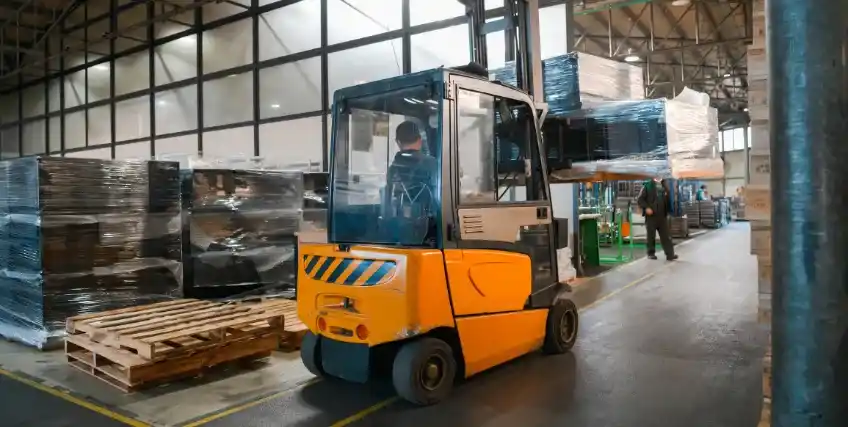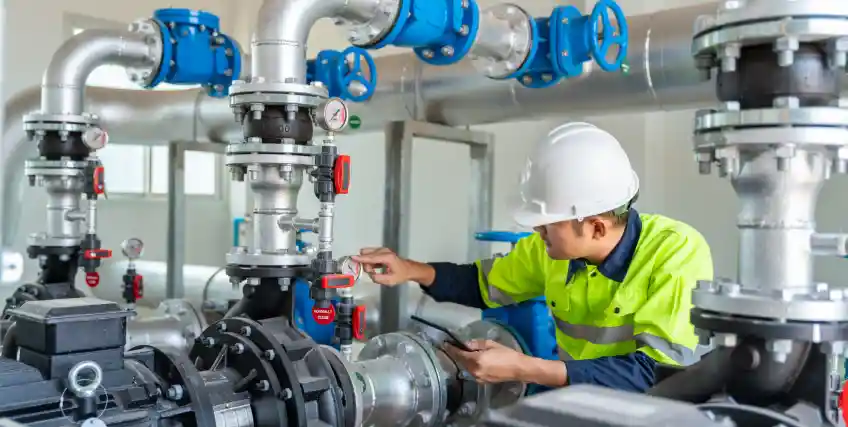Flexible Equipment Loans
to Keep Your Business Moving
Looking for Business Financing?
Apply now for flexible business financing. Biz2Credit offers term loans, revenue-based financing, and commercial real estate loans to qualified businesses.
Set up a Biz2Credit account and apply for business financing.
Running a business means having the right tools to do the job. Equipment finance helps small business owners get the equipment they need without draining cash reserves. Whether it's manufacturing machinery, company vehicles, or IT systems, equipment financing provides access to quick financing solutions with simple funding decisions and flexible terms. With the right financing program, businesses can protect working capital, maintain cash flow, and avoid large upfront costs; getting what they need without slowing operations.
What is Equipment Finance?
Equipment finance is a type of loan specifically used to buy or lease business equipment. Instead of paying the full cost upfront, businesses borrow funds and repay over time with fixed monthly payments.
This financing can be used for a wide range of assets like construction equipment, medical devices, IT systems, and vehicles. Businesses can choose between tax leases, trac leases, or small business equipment loans depending on their needs. Some financing programs also offer low doc equipment finance for faster funding decisions.
The equipment itself often serves as collateral, making credit approval easier and offering better rates than unsecured loans. Equipment financing for business purposes helps protect cash flow while providing access to essential tools for growth and operations.
How Does Equipment Finance Work?
With equipment finance, a lender provides funds to buy or lease equipment. After evaluating creditworthiness, cash flow, and business banking history, financing is approved. Once finalized, the business repays through fixed or flexible monthly payments.
Some financing programs offer fixed rate loans, keeping costs predictable. Others allow flexible financing for seasonal needs. Many businesses also opt for low doc equipment finance, which reduces paperwork and speeds up credit decisions.
Typically, the equipment acts as collateral. This reduces lender risk and may lead to faster approvals and better terms. Equipment financing solutions provide businesses a straightforward way to access vital tools without sacrificing liquidity.
Eligibility
Eligibility for equipment finance usually depends on these key areas:
Benefits of Equipment Finance
Preserve Working Capital
Equipment finance helps businesses keep cash reserves untouched. By spreading the cost over time, businesses maintain liquidity for daily operations, payroll, and unexpected expenses.
Fast Decision Process
Credit decision for equipment financing solutions can be quicker than traditional loans. Low doc equipment finance options allow small businesses to skip long paperwork processes and get faster funding.
Access to Better Equipment
Businesses can afford better, more advanced commercial equipment through financing. This boosts operational efficiency and supports business growth without large upfront investments.
Potential Tax Benefits
Many equipment loans offer tax advantages, such as deducting interest or equipment depreciation. Consulting a tax advisor ensures businesses maximize savings through available financing options.
Flexible Terms
Equipment financing programs offer varied terms to meet different business needs. Options include short or long repayment periods, adjustable monthly payments, and flexible financing structures.
Business Credit Growth
Regular, on-time payments help build business credit profiles, if the lender reports to the credit bureaus. This strengthens future borrowing opportunities and improves access to financial services like working capital loans, credit cards, and lines of credit.
Drawbacks of Equipment Finance
Higher Total Cost
Financing equipment typically costs more than paying cash up-front. Interest over time increases the total price, even with competitive financing solutions.
Risk of Equipment Depreciation
Some types of equipment, like IT systems, lose value quickly. This can leave businesses paying for assets that may not retain usefulness throughout the loan term.
Collateral Requirements
With equipment finance, the financed asset usually secures the loan. Failure to meet payment obligations can result in repossession, impacting business operations.
Risk of Over-Borrowing
Easy access to commercial equipment financing could lead businesses to borrow more than necessary. It’s important to carefully evaluate business needs and use calculators to estimate affordability.
Limited Flexibility
Some financing agreements restrict how equipment can be modified or used. Reviewing disclosures carefully ensures the terms align with operational goals.
Down Payment Needs
Some lenders may require an upfront payment before financing the remaining balance. This can strain cash flow, especially for startups and small businesses managing tight budgets.
Benefits |
Drawbacks |
01 Preserves working capital |
01 Higher total financing costs |
02 Fast decision process |
02 Equipment depreciation risk |
03 Access to better equipment |
03 Equipment acts as collateral |
04 Possible tax benefits |
04 Risk of over-borrowing |
05 Flexible repayment options |
05 Limited equipment flexibility |
06 Builds business credit |
06 Possible down payment needed |
Equipment Financing vs Equipment Leasing
Equipment financing leads to ownership once the loan is fully paid. Equipment leasing, on the other hand, allows businesses to rent equipment for a set time, often with lower monthly payments but without building ownership unless buying the equipment at lease-end. Leasing is often better for equipment with a short useful life, like IT hardware, while financing suits businesses looking for long-term use and investment management of their assets.
Is Equipment Finance Same as Debt Finance?
Equipment finance is a type of debt finance. It is specifically tied to purchasing business equipment, using the asset itself as collateral. Unlike general business loans or lines of credit that can fund any business activity, equipment financing solutions are restricted to equipment purchases. This targeted approach helps protect working capital and keeps financial services focused on asset growth.
Industries That Use Equipment Finance
Equipment finance is used across construction, healthcare, manufacturing, transportation, and agriculture. Companies rely on financing solutions to obtain construction equipment, medical devices, commercial vehicles, and IT systems without risking liquidity. Financing programs offer businesses a way to grow and stay competitive without tying up savings accounts or real estate assets.
Alternative Financing Options to Equipment Loans
Business Lines of Credit
A line of credit provides ongoing access to funds for various business needs. Unlike equipment finance, these funds can be used for payroll, inventory, or emergencies. They offer flexible drawdowns through online banking and FDIC-insured accounts.
SBA Loans
SBA loans offer low-interest, government-backed funding. They can be used for equipment, working capital, or real estate. However, the process for credit approval is often more detailed and slower than typical equipment financing.
Equipment Leasing
Leasing provides access to business equipment without long-term ownership. Monthly payments are usually lower, making it attractive for fast-changing industries like technology and healthcare. Leasing options like trac leases or tax leases provide added flexibility.
Short-Term Business Loans
Short-term business loans deliver fast cash for urgent purchases. While they come with higher interest rates, they are easier to qualify for and may suit businesses needing immediate financing solutions for equipment or other investments.
Equipment Financing Articles
Equipment Lending Financing Solutions for Small Business Growth
Being a small business owner in the United States often means balancing growth along with financial challenges.
Possible Tax Benefits of Commercial Equipment Financing What You Need to Know
Commercial equipment financing plays a critical role for businesses looking to acquire essential assets without
5 Signs Your Business Should Consider Equipment Financing Right Now
Small business owners across the U.S. understand the value of having the right tools for the job.
What to Look for in an Equipment Financing Company Before You Sign Anything
What’s the most important thing that powers your small business? It’s equipment. These serve as the backbone of your daily business operations
Some Best Equipment Leasing Companies for Small Businesses
If you’re looking for equipment leasing companies, you should know that the features and characteristics will vary according to their popularity.
FAQs for Equipment Financing
1. What kind of equipment can be purchased with this loan?
Equipment finance covers vehicles, construction equipment, medical devices, IT systems, and more. Businesses can access commercial equipment financing for nearly any essential business equipment.
2. What are the general terms for equipment finance?
Most lenders usually keep loan duration from 2 to 7 years. Fixed rate options are common, and some lenders offer flexible financing structures depending on business needs and credit approval.
3. Is it hard to get a loan for equipment?
Businesses with strong credit, steady cash flow, or access to low doc equipment finance can often qualify easily. Using equipment as collateral helps speed up approvals.
4. Can startups qualify for equipment loans?
Startups may need strong personal credit and a clear business plan to qualify for small business equipment loans or other financing solutions.
5. What is the difference between equipment finance and equipment leasing?
Equipment finance leads to ownership after the loan is paid off. Equipment leasing is a rental agreement that may end without ownership unless there's a buyout option. Leasing often suits short-term or fast-depreciating equipment needs.





